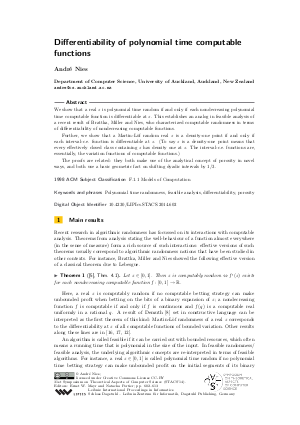Differentiability of polynomial time computable functions
Author André Nies
-
Part of:
Volume:
31st International Symposium on Theoretical Aspects of Computer Science (STACS 2014)
Part of: Series: Leibniz International Proceedings in Informatics (LIPIcs)
Part of: Conference: Symposium on Theoretical Aspects of Computer Science (STACS) - License:
 Creative Commons Attribution 3.0 Unported license
Creative Commons Attribution 3.0 Unported license
- Publication Date: 2014-03-05
File

PDF
LIPIcs.STACS.2014.602.pdf
- Filesize: 0.56 MB
- 12 pages
Document Identifiers
Subject Classification
Keywords
- Polynomial time randomness
- feasible analysis
- differentiability
- porosity
Metrics
- Access Statistics
-
Total Accesses (updated on a weekly basis)
0Document
0Metadata
Abstract
We show that a real z is polynomial time random if and only if each nondecreasing polynomial time computable function is differentiable at z. This establishes an analog in feasible analysis of a recent result of Brattka, Miller and Nies, who characterized computable randomness in terms of differentiability of nondecreasing computable functions. Further, we show that a Martin-Loef random real z is a density-one point if and only if each interval-c.e. function is differentiable at z. (To say z is a density-one point means that every effectively closed class containing z has density one at z. The interval-c.e. functions are, essentially, the variation functions of computable functions.) The proofs are related: they both make use of the analytical concept of porosity in novel ways, and both use a basic geometric fact on shifting dyadic intervals by 1/3.
Cite As Get BibTex
André Nies. Differentiability of polynomial time computable functions. In 31st International Symposium on Theoretical Aspects of Computer Science (STACS 2014). Leibniz International Proceedings in Informatics (LIPIcs), Volume 25, pp. 602-613, Schloss Dagstuhl – Leibniz-Zentrum für Informatik (2014)
https://doi.org/10.4230/LIPIcs.STACS.2014.602
BibTex
@InProceedings{nies:LIPIcs.STACS.2014.602,
author = {Nies, Andr\'{e}},
title = {{Differentiability of polynomial time computable functions}},
booktitle = {31st International Symposium on Theoretical Aspects of Computer Science (STACS 2014)},
pages = {602--613},
series = {Leibniz International Proceedings in Informatics (LIPIcs)},
ISBN = {978-3-939897-65-1},
ISSN = {1868-8969},
year = {2014},
volume = {25},
editor = {Mayr, Ernst W. and Portier, Natacha},
publisher = {Schloss Dagstuhl -- Leibniz-Zentrum f{\"u}r Informatik},
address = {Dagstuhl, Germany},
URL = {https://drops.dagstuhl.de/entities/document/10.4230/LIPIcs.STACS.2014.602},
URN = {urn:nbn:de:0030-drops-44919},
doi = {10.4230/LIPIcs.STACS.2014.602},
annote = {Keywords: Polynomial time randomness, feasible analysis, differentiability, porosity}
}
